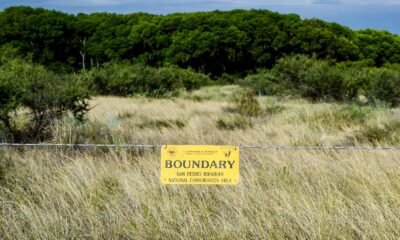Education
Bayard Rustin: The Overlooked Trailblazer of Civil and Gay Rights

In a deep exploration of Bayard Rustin’s life, “Bayard Rustin: American Dreamer” sheds light on a pivotal figure in 20th-century activism. The biography reveals Rustin not only as a key voice for civil rights but also as a multifaceted leader who championed various causes, including labor rights and LGBTQ+ advocacy.
Born on March 17, 1912, in West Chester, Pennsylvania, Rustin was one of twelve siblings. His grandmother’s work with the NAACP profoundly shaped his commitment to social justice. This influence saw figures such as W.E.B. Du Bois visit their home, fostering a strong sense of community activism.
Rustin played significant roles in multiple foundational civil rights organizations, including the Congress of Racial Equality and the Southern Christian Leadership Conference. His collaboration with A. Philip Randolph during the 1941 March on Washington Movement led to an executive order from President Franklin Roosevelt, which prohibited racial discrimination in defense industries.
Post-World War II, Rustin continued his advocacy, successfully pushing for the desegregation of the U.S. military under President Harry Truman. His pacifist ideals led him to refuse military service during the war, resulting in his imprisonment as a conscientious objector. Following his release, he became entrenched in pacifist organizations like the Fellowship of Reconciliation.
In 1956, Rustin’s expertise in organizing culminated in his connection with Martin Luther King Jr. during the Montgomery Bus Boycott. Their collaboration would have a lasting impact, influencing landmark legislation like the Civil Rights Act of 1964 and the Voting Rights Act of 1965.
Rustin is perhaps best known for orchestrating the historic 1963 March on Washington for Jobs and Freedom. This event, crucial in galvanizing civil rights momentum, nearly faltered due to Rustin’s sexuality, which faced scrutiny from both opponents and some allies within the movement. However, Randolph’s intervention secured Rustin’s position as the march’s organizer.
Amid the preparations, he confronted a hostile political landscape, notably enduring a denunciation from Senator Strom Thurmond. Nevertheless, King recognized Rustin’s unparalleled organizational skills, allowing him to orchestrate a monumental gathering of over 250,000 participants.
Rustin’s life was marked by complex choices. He often had to navigate conflicting principles, such as prioritizing pacifism during World War II over civil rights or tempering his critique of President Johnson during the Vietnam War. Such decisions often alienated former allies, yet Rustin remained committed to supporting those he viewed as oppressed, regardless of their identity.
Rustin’s dedication transcended single-issue politics; he advocated for various marginalized groups worldwide. He believed in prioritizing human well-being over rigid ideological boundaries. Though he passed away in 1987, his radical vision remains influential, echoing through contemporary discussions on intersectionality and social justice.
















